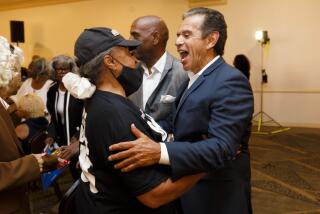Now comes the real Villaraigosa era
- Share via
The second and final terms of City Controller Laura Chick and City Atty. Rocky Delgadillo ended in July, and now, with the departure of Los Angeles Police Chief William J. Bratton, so does the second and final term of Mayor James K. Hahn.
Hahn? Wait a minute, you say. He had no second term. He’s been gone from City Hall for four years, soundly defeated by Antonio Villaraigosa in their second mayoral showdown.
Voters thought they were making a clean break when they rejected Hahn in 2005. Villaraigosa was a breath of fresh air: a Latino mayor for an increasingly Latino city, an electric personality, a figure who could recapture for Los Angeles the national spotlight and finally fulfill the city’s destiny as the international metropolis of the future.
But Villaraigosa’s first term largely failed to deliver real change. The mayor’s plan to improve schools sputtered; his housing initiatives ran aground in court; his (remarkable) achievement in securing funding for a “subway to the sea” has yet to result in new track; his anti-gang program never demonstrated much success. His achievements came primarily in the areas where he followed in Hahn’s footsteps.
How different, really, would the last few years have been with Hahn still at the helm? Campaign rhetoric notwithstanding, the new mayor embraced the previous administration’s policies. Environmental responsibility, labor peace, progressive politics, forward-looking transit, affordable housing -- all were hallmarks of the Hahn era. And as for Hahn’s most lasting legacy -- his selection of Bratton -- the chief remained the dominant force in Los Angeles civic life during Villaraigosa’s first term. The craftiest politician, the best communicator, the defining presence was not the mayor who landed on the cover of Newsweek and, later, in the nationwide gossip columns, but the chief handed down to him by his predecessor.
Hahn was a mayor in the Los Angeles tradition, steady and calming rather than dynamic. So it was almost unsettling when he picked the Boston-accented, New York-attuned Bratton to be police chief. Wouldn’t the chief’s outsized personality dwarf the mayor? Hahn didn’t seem to mind.
When Villaraigosa inherited Bratton, he had the political smarts not to try to outshine him, as difficult as it may often have been given Villaraigosa’s obvious relish for the spotlight. Villaraigosa also knew not to mess with Bratton’s successes -- declining crime rates, a more professional department, vastly improved community relations. And although Villaraigosa had previously helped derail his predecessor’s bid to expand the Police Department to 10,000 officers, once he became mayor, he made the target his own and stuck to it tenaciously -- and wisely.
On the environment too, Villaraigosa’s first term was in many ways simply a continuation of Hahn’s. Before the current mayor began calling for 20% of city power to be produced from renewable sources by 2010, his predecessor had set a goal of 17% by 2017. Hahn began the city’s retreat from dependence on coal-fired power plants, something Villaraigosa has pledged to fully achieve by 2020. Hahn oversaw a deal to get container vessels to begin plugging in to electric power at the port rather than running on polluting fuels during loading and unloading.
It was also Hahn who made affordable housing a city priority, and brought in attorney and nonprofit-housing expert Mercedes Marquez to run the Housing Department, where she stayed -- and provided Villaraigosa some of his best housing successes -- until earlier this year, when President Obama tapped her for a key post in the Department of Housing and Urban Development.
Even Villaraigosa’s strong support of unions can’t be viewed as a departure. Many key labor unions, remember, were so happy with Hahn that they stood by him in his reelection fight rather than flee to Villaraigosa, despite the challenger’s impeccable pro-labor credentials. Villaraigosa campaigned on a message of change, but in fact what he promised was to up the ante on Hahn’s agenda. More environmentalism, more affordable housing, more potholes filled, better transit. He would out-Hahn Hahn.
In some ways, Villaraigosa’s first term reached back even further. Many of the people he hired to his top staff had also served Mayor Richard Riordan. And both Villaraigosa and Hahn echoed Riordan’s pledge to make Los Angeles “the safest big city in America.” Yes, it is Villaraigosa who has come closest to achieving the goal. But his real achievements in reducing crime and remaking the relationship between the LAPD and the community it serves are largely the result of Hahn’s decision to pick Bratton.
There was the usual coming and going of top staff and general managers during Villaraigosa’s first term, but this summer, after the second inauguration, many of the bigger players held over from Hahn’s tenure -- and Riordan’s -- submitted their resignations. In addition to Marquez, losses included Chief of Staff Robin Kramer, who had the same job in the Riordan administration. And now, of course, Bratton.
The departures will hurt -- particularly that of Bratton. The mayor no longer will be able to prop up his resume on the basis of the achievements of talent selected by his predecessor.
With Bratton and the others gone, Villaraigosa will have to show, on his own, whether he has the goods to lead Los Angeles. Over the last four years, he often seemed more manic than driven, more fumbling than creative. His City Hall at its best looked, in many ways, like -- well, like Hahn’s.
Hahn II has now concluded. With Bratton on his way back to the East Coast, the real Villaraigosa era now gets underway.
--
More to Read
Sign up for Essential California
The most important California stories and recommendations in your inbox every morning.
You may occasionally receive promotional content from the Los Angeles Times.











